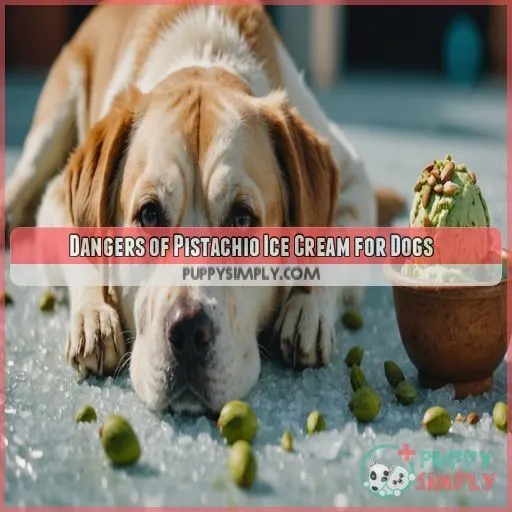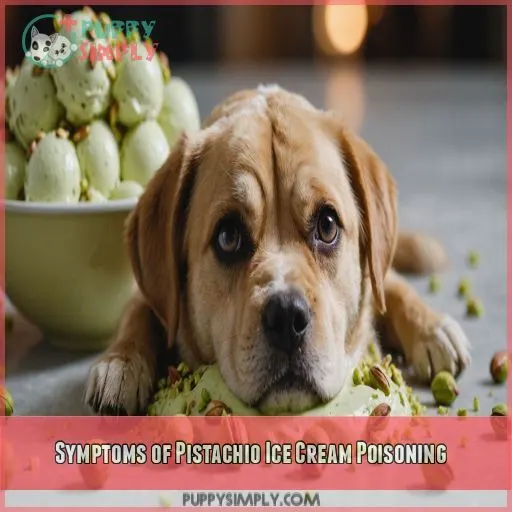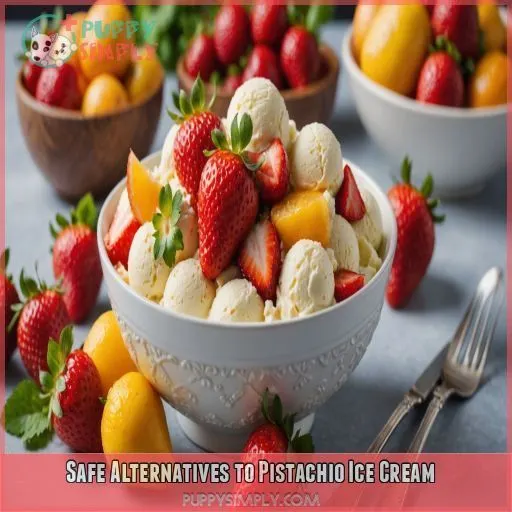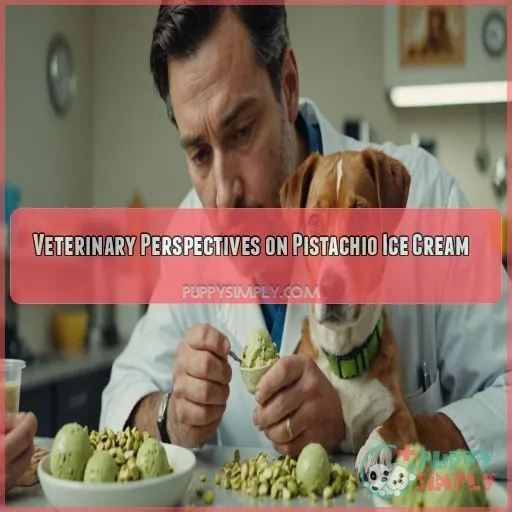This site is supported by our readers. We may earn a commission, at no cost to you, if you purchase through links.

While pistachios themselves aren’t toxic to dogs, pistachio ice cream is a whole different story.
It’s high in fat, sugar, and potentially toxic ingredients like xylitol.
Feeding your fur baby pistachio ice cream can lead to pancreatitis, diarrhea, and even seizures.
So, it’s best to keep that creamy treat out of reach.
But don’t worry, we’ve got the scoop on safe alternatives and dog-friendly frozen treats that’ll make your pup’s tail wag.
Stay tuned for the inside scoop!
Table Of Contents
- Key Takeaways
- Dangers of Pistachio Ice Cream for Dogs
- Nutritional Composition of Pistachio Ice Cream
- Health Risks of Pistachios for Dogs
- Symptoms of Pistachio Ice Cream Poisoning
- Safe Alternatives to Pistachio Ice Cream
- Emergency Response to Accidental Pistachio Consumption
- Nutritional Benefits of Pistachios for Dogs
- Homemade Dog-Safe Pistachio-Flavored Treats
- Can Dogs Eat Other Nut-Based Ice Creams?
- Veterinary Perspectives on Pistachio Ice Cream
- Frequently Asked Questions (FAQs)
- Can dogs eat ice cream with nuts?
- What flavors of ice cream can dogs eat?
- Can dogs have pistachios ice cream?
- What happens if a dog eats pistachios?
- Can puppies eat pistachio ice cream in small amounts safely?
- Are pistachio ice creams risks similar to peanut butter risks?
- Can dogs develop allergies to pistachios from eating ice cream?
- Do pistachio ice creams health risks vary by dog breed?
- Can pistachio ice cream cause long-term health issues in dogs?
- Conclusion
Key Takeaways
- You’ll want to steer clear of pistachio ice cream for your furry friend, as it’s a triple threat of high fat, sugar, and potentially toxic ingredients like xylitol—a combo that can lead to pancreatitis, seizures, and even death.
- Don’t assume a little pistachio ice cream won’t hurt—even small amounts can cause big problems, especially for puppies, small breeds, or dogs with pre-existing health conditions.
- If your dog does sneak a taste of pistachio ice cream, monitor them closely for signs of trouble, like vomiting, diarrhea, lethargy, or difficulty breathing, and get them to the vet promptly if you notice anything off.
- Instead of pistachio ice cream, treat your pup to dog-friendly frozen goodies, like peanut butter popsicles or lactose-free yogurt drops, and always check with your vet before introducing new treats to ensure they’re safe and healthy for your furry friend.
Dangers of Pistachio Ice Cream for Dogs
You might think sharing a scoop of pistachio ice cream with your furry friend is a sweet treat, but it could be a recipe for disaster. From high fat content to potential toxins, pistachio ice cream poses several dangers that could leave your pup in a world of trouble.
High Fat Content
Your pup’s eyes might light up at the sight of pistachio ice cream, but beware! This creamy treat packs a fatty punch that could spell trouble. High-fat foods can lead to pancreatitis and pack on unwanted pounds faster than you can say "woof!
Lactose Intolerance in Dogs
You see, dogs are lactose intolerant, meaning they can’t digest lactose in dairy products like pistachio ice cream. Here are a few things to keep in mind:
- Lactose-free dog treats are a safer option.
- Dairy-free alternatives can be just as tasty.
- Symptoms of lactose intolerance include diarrhea, gas, and bloating.
- Dog milk substitutes can provide essential nutrients.
- Dairy-free dog food is a great long-term solution.
Sugar and Artificial Sweeteners
When it comes to pistachio ice cream, sugar and artificial sweeteners are bad news for your dog’s health. Xylitol, in particular, can be deadly, so it’s vital to keep it out of reach.
Potential Choking Hazards
You’re probably thinking, "What’s the big deal about pistachio ice cream?" Well, those small, hard treats can be a choking hazard for your furry friend, especially if they’re not the right dog chew size.
- Imagine your dog gobbling up a pistachio shell, which can get stuck in their throat or digestive tract.
- Picture the panic when your dog starts choking on a pistachio, and you’re not sure what to do.
- Envision the relief when you learn about safe alternatives, like lactose-free ice cream or peanut butter treats, that can satisfy your dog’s cravings without the choking risk.
Xylitol Toxicity Risk
Watch out for xylitol in pistachio ice cream – it’s toxic to dogs! Even small amounts can cause seizures, liver failure, and death. Keep xylitol-containing treats, like gum and ice cream, out of reach.
Nutritional Composition of Pistachio Ice Cream
You’re probably wondering what’s really in pistachio ice cream that makes it so bad for your furry friend. Let’s break down the nutritional composition of pistachio ice cream, looking at its caloric density, protein and fat content, carbohydrate and sugar levels, vitamin and mineral profile, and artificial additives and preservatives to understand why it’s not a treat for your dog.
Caloric Density
When it comes to pistachio ice cream, you need to think about its caloric density – it’s a calorie-dense treat that can lead to dog obesity risk if not managed with portion control and a balanced diet.
Protein and Fat Content
When it comes to pistachio ice cream, you need to think about the protein and fat content. A high fat-to-protein ratio can be detrimental to your dog’s digestive system, so be cautious with this treat.
Carbohydrate and Sugar Levels
You’re probably wondering about the carb and sugar levels in pistachio ice cream. Here’s the scoop:
- High sugar content: A single serving can contain up to 30 grams of sugar!
- Carb impact: Pistachio ice cream can cause a spike in blood sugar, especially in diabetic dogs.
- Sweetener alternatives: Some ice creams use xylitol, a sugar substitute toxic to dogs.
Vitamin and Mineral Profile
Now, let’s talk vitamins and minerals in pistachio ice cream. Here’s a breakdown:
| Vitamin/Mineral | Amount per serving |
|---|---|
| Vitamin A | 10% of the Daily Value (DV) |
| Vitamin B6 | 20% of the DV |
| Calcium | 15% of the DV |
| Iron | 10% of the DV |
| Potassium | 20% of the DV |
Artificial Additives and Preservatives
Artificial additives and preservatives in pistachio ice cream can trigger dog allergies and health concerns. Opt for natural alternatives like peanut butter or high-quality dog treats instead. Always check the ingredients list!
Health Risks of Pistachios for Dogs
Those little green nuts might be a tasty treat for you, but they can spell trouble for your pup. Pistachios come with a bunch of risks that could have your dog feeling pretty ruff, from choking hazards to something called aflatoxin poisoning—yikes!
Pancreatitis Risk From High Fat
Now that you know the nutritional composition of pistachio ice cream, let’s talk about the risks. A high-fat diet can lead to dog pancreatitis, and pistachios are no exception – their fat content is a major concern.
Intestinal Blockage From Shells
Watch out for those pesky pistachio shells! If your dog swallows one, it can cause an intestinal blockage. Make sure to remove shells and monitor your dog for symptoms like vomiting, diarrhea, or lethargy.
Urushiol-Induced Allergic Reactions
Now that we’ve covered intestinal blockages, let’s talk about another risk: Urushiol-Induced Allergic Reactions. If your dog’s sensitive to urushiol, pistachios can cause some nasty symptoms. Here are a few things to watch out for:
- Red, itchy skin
- Swelling, especially around the face and paws
- Excessive scratching or chewing
- Hair loss
- Skin infections
Aflatoxin Contamination Concerns
Now, let’s talk about aflatoxin contamination concerns. Aflatoxin is a mold that can grow on pistachios, especially if they’re stored improperly. Make sure to store pistachios in a cool, dry place to prevent aflatoxin growth.
Salt Toxicity in Flavored Varieties
If you’re giving your dog flavored pistachios, watch out for the salt content! Eating too much can lead to sodium toxicity in dogs, causing vomiting, diarrhea, and even seizures – a serious ice cream danger to watch out for.
Symptoms of Pistachio Ice Cream Poisoning
You’re probably wondering what to look out for if your furry friend accidentally gets their paws on some pistachio ice cream.
Here are the signs of poisoning you need to know.
If your dog has ingested pistachio ice cream, keep an eye out for symptoms like vomiting, diarrhea, lethargy, and in severe cases, pancreatitis, xylitol poisoning, or even life-threatening allergic reactions.
Gastrointestinal Distress Signs
If your dog ingests pistachio ice cream, watch for gastrointestinal distress signs like vomiting, diarrhea, abdominal pain, loss of appetite, and gas – these can be painful and potentially life-threatening if left untreated.
Allergic Reaction Indicators
If your dog has an allergic reaction to pistachio ice cream, watch for skin rashes, itchy paws, sneezing, vomiting, and diarrhea. These symptoms can be super uncomfortable for your furry friend, so act fast!
Pancreatitis Symptoms
If your furry friend has pancreatitis, you’ll notice vomiting, diarrhea, lethargy, and a loss of appetite. They might also show signs of abdominal pain, like whining or restlessness – get them to the vet ASAP!
Xylitol Poisoning Manifestations
If your dog ingests xylitol-laced pistachio ice cream, watch for symptoms like vomiting, lethargy, seizures, and jaundice, which can lead to liver failure and low blood sugar – a potentially deadly combo.
Dehydration and Electrolyte Imbalance
As your furry friend suffers from xylitol poisoning, dehydration and electrolyte imbalance set in. Keep an eye out for these red flags:
- Dry, cracked lips and nose
- Lethargy and dark urine
- Loss of appetite
- Vomiting or diarrhea
Safe Alternatives to Pistachio Ice Cream
You’re probably thinking, "No pistachio ice cream for my pup, but what can I give them instead?" Don’t worry, there are plenty of safe and yummy alternatives to pistachio ice cream that your furry friend will love, from dog-friendly frozen treats to homemade lactose-free ice cream recipes.
Dog-Friendly Frozen Treats
Now, let’s chill with some dog-friendly frozen treats! Consider store-bought or homemade frozen yogurt options, peanut butter popsicles, or even sweet potato ‘ice cream’ – all yummy and safe for your furry friend!
Homemade Lactose-Free Ice Cream Recipes
Now that we’ve covered dog-friendly frozen treats, let’s get creative with homemade lactose-free ice cream recipes! Try a frozen yogurt base with dairy-free options, flavor variations, and vegan recipes to satisfy your pup’s cravings.
Nutritious Fruit-Based Frozen Snacks
- Frozen Banana Treats: Blend ripe bananas with a pinch of salt, then freeze.
- Mango Sorbet Recipes: Mix pureed mango with a splash of coconut milk, freeze, and serve.
- Homemade Pawsicles: Combine yogurt, honey, and your pup’s favorite fruits, pour into popsicle molds, and enjoy!
Commercial Dog Ice Cream Options
Considering commercial dog ice cream options? Look for brands with wholesome ingredients, safety certifications, and rave customer reviews. Compare prices and ingredients, ensuring a sweet treat that’s safe and healthy for your furry friend.
Low-Fat Yogurt Alternatives
- Greek yogurt, rich in protein and probiotics
- Kefir, with its diverse gut-friendly bacteria
- Cottage cheese, a tasty source of protein and calcium
Emergency Response to Accidental Pistachio Consumption
If your furry friend has accidentally gobbled up some pistachio ice cream, don’t panic – but do act quickly to minimize potential harm. Your prompt response can make a huge difference in preventing serious complications, so let’s get started on the essential steps to take and when to seek veterinary help.
Immediate Steps to Take
If your dog has gobbled up pistachio ice cream, stay calm! Immediately remove access to the treat, monitor closely for symptoms, and induce vomiting only if advised by a vet – don’t try to DIY!
When to Contact a Veterinarian
If your dog eats a pistachio with the shell on, or shows symptoms like vomiting, diarrhea, loss of appetite, or lethargy, contact your veterinarian ASAP – it’s always better to err on the side of caution!
Home Monitoring Techniques
Keep a close eye on your furry friend! Monitor for changes in dog behavior, appetite loss, vomiting frequency, diarrhea consistency, and energy levels. If symptoms worsen or persist, seek veterinary help ASAP!
Potential Treatments and Interventions
If your dog ingests pistachio ice cream, your vet may recommend inducing vomiting, administering activated charcoal, or providing fluid therapy and gastrointestinal protectants. Supportive care is key to helping your furry friend recover.
Follow-Up Care and Prevention
If your dog accidentally eats pistachio ice cream, follow-up care is really important. Monitor for signs of toxicity, and consult your vet. To prevent future incidents, consider these measures:
- Store pistachios and ice cream safely out of reach.
- Opt for dog-safe pistachio treats or alternatives.
- Keep an eye on your dog’s behavior and health.
- Schedule regular check-ups to monitor for long-term health effects.
Nutritional Benefits of Pistachios for Dogs
You’re probably wondering if there’s any good news about pistachios for dogs – and the answer is yes! While pistachios are largely a no-go for your furry friend, they do contain some beneficial nutrients like antioxidants, protein, and fiber that can be great for dogs in moderation and in the right form.
Antioxidant Properties
You want the best for your furry friend, and that includes antioxidant-rich foods! Pistachios are a great source of antioxidants, which help protect your dog’s cells from damage, promoting overall health and well-being.
Protein and Fiber Content
You’ll be happy to know that pistachios are a good source of protein and fiber for dogs, supporting healthy digestion and satiety. However, always consult with your vet before making any changes to your dog’s diet.
Healthy Fat Profile
As you consider pistachios for your pup, remember they contain healthy fats, including omega-3s, which support dog digestion and meet dietary needs, but moderation is key to avoid upsetting their sensitive tummies.
Vitamin and Mineral Contributions
Now that we’ve covered the healthy fat profile of pistachios, let’s explore their vitamin and mineral contributions that can benefit your furry friend. Here are a few key players:
- Vitamin K for blood clotting and bone health
- Calcium and magnesium for strong bones and teeth
- Potassium, iron, and other essential minerals for overall well-being
Potential Anti-Inflammatory Effects
You’ll be happy to know that pistachios have anti-inflammatory benefits for your furry friend! Rich in antioxidants and vitamins, they can help soothe and calm your dog’s digestive system, promoting overall canine health.
Homemade Dog-Safe Pistachio-Flavored Treats
You want to spoil your furry friend with pistachio treats, but you’re wise to avoid store-bought pistachio ice cream due to its toxic risks. Instead, you can whip up your own dog-safe pistachio-flavored goodies at home, from biscuits to frozen yogurt pops, with some simple ingredient swaps and careful portion control.
Pistachio-Inspired Dog Biscuit Recipes
You can whip up allergy-friendly, pistachio-inspired dog biscuits at home using safe ingredients like oats, peanut butter, and honey. Get creative with recipe variations to boost nutritional value and tantalize your pup’s taste buds!
Frozen Yogurt Pistachio Pops
- Mix & match: Combine plain, unflavored yogurt with honey, peanut butter, or pumpkin puree for added flavor.
- Fruit additions: Introduce new fruits like blueberries, strawberries, or bananas to create a tasty and flavorful twist.
- Pistachio magic: Add a pinch of pistachio meal or a few pistachio pieces for a delightful crunch.
- Dairy-free options: Swap traditional yogurt with coconut or almond-based alternatives for a dog-friendly, lactose-free treat.
Pistachio-Flavored Dog Chews
Now, let’s make pistachio-flavored dog chews! Using homemade recipes with safe ingredients, you can create a chewy texture that’s perfect for dental benefits. Compare brands, but prioritize your pup’s safety and preferences.
Safe Ingredient Substitutions
When making homemade dog treats, swap pistachios with safe alternatives like peanut butter, lactose-free yogurt, or fruits. Opt for dog-friendly nuts like peanuts or cashews, and always choose lactose-free and low-fat ingredients.
Portion Control and Feeding Guidelines
When making homemade dog-safe pistachio-flavored treats, remember to keep portion control in check. You want to reward your furry friend, not overfeed them. Here are some guidelines to follow:
- Limit treats to 10% of your dog’s daily calorie intake
- Consider your dog’s age, breed, and activity level when determining treat frequency
- Count those calories to avoid weight gain and obesity
- For small breeds, choose bite-sized treats to prevent choking hazards
Can Dogs Eat Other Nut-Based Ice Creams?
Now that you know pistachio ice cream is off-limits for your furry friend, you’re probably wondering if other nut-based ice creams are safe for them to enjoy. Let’s explore the safety of almond, peanut butter, coconut, and cashew-based frozen treats for your dog.
Almond Ice Cream Considerations
Considering almond ice cream for your furry friend? Be cautious of almond allergies and lactose content. Opt for dog-friendly brands or homemade recipes with sugar substitutes to make sure your pup has a safe and enjoyable treat.
Peanut Butter Ice Cream Safety
Now, let’s talk peanut butter ice cream safety. Generally, it’s a safer bet than pistachio, but beware of xylitol content and potential peanut butter allergies. Opt for safe brands or try a homemade recipe.
Coconut Ice Cream Alternatives
Considering coconut ice cream alternatives? You’re on the right track! Coconut milk recipes can be a dairy-free, dog-friendly option. Try frozen yogurt or homemade alternatives using dog-safe substitutes for a tasty, worry-free treat.
Cashew-Based Frozen Treats
If you’re considering cashew-based frozen treats, beware of potential allergies. Here are three things to keep in mind:
- Some dogs may be allergic to cashews, so monitor for signs of a reaction.
- Homemade recipes can be a safer option, but be sure to use dog-safe ingredients.
- Commercial brands may contain added sugars or preservatives, so choose wisely.
General Nut Ice Cream Precautions
When exploring other nut-based ice creams, remember to check ingredient labels for potential allergens and toxins. Consider homemade options with safe substitutions, and always store them securely to avoid accidental ingestion.
Veterinary Perspectives on Pistachio Ice Cream
You’re probably wondering what your vet has to say about pistachio ice cream for dogs – and trust us, their opinions are worth listening to. From recommended dietary guidelines to real-life case studies of pistachio ingestion, here’s what the professionals have to say about this tasty but potentially toxic treat.
Professional Opinions on Risks
If you’re thinking about sharing pistachio ice cream with your dog, vets say it’s a big no-no. Here’s why:
- High fat content can lead to pancreatitis
- Xylitol is a silent killer
- Lactose intolerance is no joke
- Shells can cause intestinal blockages
- Breed-specific sensitivities are real
Recommended Dietary Guidelines
When it comes to treats, follow these guidelines: limit snack frequency, monitor food allergies, and prioritize water intake. Consider homemade treats or consult with your vet for dog food brand recommendations.
| Treat Type | Recommended Frequency |
|---|---|
| Homemade Treats | 1-2 times a week |
| Store-bought Treats | 1 time a week |
| Pistachio-based Treats | Avoid entirely |
Case Studies of Pistachio Ingestion
You’re probably wondering what happens when dogs eat pistachio ice cream. Let’s take a look at some real-life case studies:
- Mild symptoms: A 2-year-old Beagle named Max experienced mild vomiting after eating a small amount of pistachio ice cream.
- Severe pancreatitis: A 5-year-old Poodle named Fifi developed severe pancreatitis after devouring a whole pint of pistachio ice cream.
- Allergic reaction: A 1-year-old Bulldog named Rocky broke out in hives and had difficulty breathing after eating pistachio ice cream with urushiol.
- Intestinal blockage: A 3-year-old Chihuahua named Lola required surgery to remove a pistachio shell that caused an intestinal blockage.
Long-Term Health Impact Assessment
As you consider the long-term effects of pistachio ice cream on your dog, remember that chronic pancreatitis, digestive issues, and obesity are real risk factors, making a balanced diet really important for their overall health.
Breed-Specific Considerations and Sensitivities
When thinking about pistachio ice cream, breed-specific considerations matter. Your furry friend’s ancestry can increase their risk of adverse reactions. Here are some breeds that require extra caution:
- Poodles: notorious for food sensitivities
- Labradors: prone to digestive issues
- Toy breeds: high risk of choking hazards
- Bulldogs: susceptible to allergic reactions
- Terriers: may experience skin irritations
Frequently Asked Questions (FAQs)
Can dogs eat ice cream with nuts?
Did you know that over 70% of dogs are lactose intolerant?! So, with ice cream that has nuts in it, you’re dealing with a double whammy. The dairy can upset their stomach, and the nuts can be a choking hazard or even toxic.
What flavors of ice cream can dogs eat?
You’re wondering what flavors of ice cream are safe for your furry friend? Stick to plain, lactose-free options like peanut butter or pumpkin – and always check with your vet before sharing a sweet treat!
Can dogs have pistachios ice cream?
Sorry to crush your pup’s dessert dreams, but pistachio ice cream is a no-go! The high fat, sugar, and potential xylitol content can be toxic to dogs. Opt for pup-friendly treats instead, like peanut butter or carrots.
What happens if a dog eats pistachios?
If your dog eats pistachios, don’t panic! Shelled pistachios are usually okay, but shells can cause blockages. Watch for signs of toxicity like vomiting, diarrhea, and skin irritation, and call your vet if you notice anything weird.
Can puppies eat pistachio ice cream in small amounts safely?
Don’t go nuts! While pistachios themselves are a mixed bag for pups, pistachio ice cream is a definite no-go for puppies, even in small amounts, due to its high fat, sugar, and potential xylitol content.
Are pistachio ice creams risks similar to peanut butter risks?
Sorry to burst your bubble, but pistachio ice cream risks for dogs aren’t similar to peanut butter risks. While peanut butter is generally safe in moderation, pistachio ice cream’s high fat, sugar, and potential xylitol content make it a no-go for your furry friend.
Can dogs develop allergies to pistachios from eating ice cream?
You’re wondering if pistachio ice cream can trigger allergies in dogs? Well, yes, it’s possible. Pistachios contain urushiol, a compound that can cause allergy-like symptoms in dogs, and ice cream can increase the risk.
Do pistachio ice creams health risks vary by dog breed?
When it comes to pistachio ice cream, health risks can vary by dog breed, but let’s be real, it’s not a good idea for any pup. Some breeds, like those prone to pancreatitis, are more sensitive to fatty treats.
Can pistachio ice cream cause long-term health issues in dogs?
Imagine your furry friend’s pancreas as a tiny, temperamental chef – it can get overwhelmed by pistachio ice cream‘s high fat content, leading to long-term health issues like pancreatitis, obesity, and digestive problems if fed regularly.
Conclusion
Can dogs eat pistachio ice cream? Absolutely not!
Pistachio ice cream poses perilous risks, from pancreatitis to seizures, due to its high fat, sugar, and toxic ingredients like xylitol.
Instead, indulge your fur babies in dog-friendly frozen treats or homemade lactose-free ice cream recipes.
Your pup’s tail will wag with joy, and you’ll rest easy knowing you’re serving a safe, sweet treat.
















